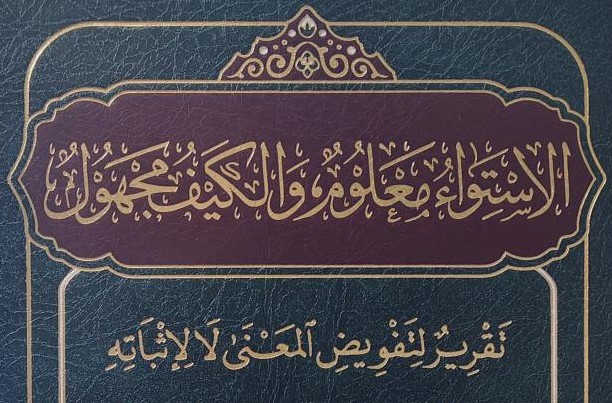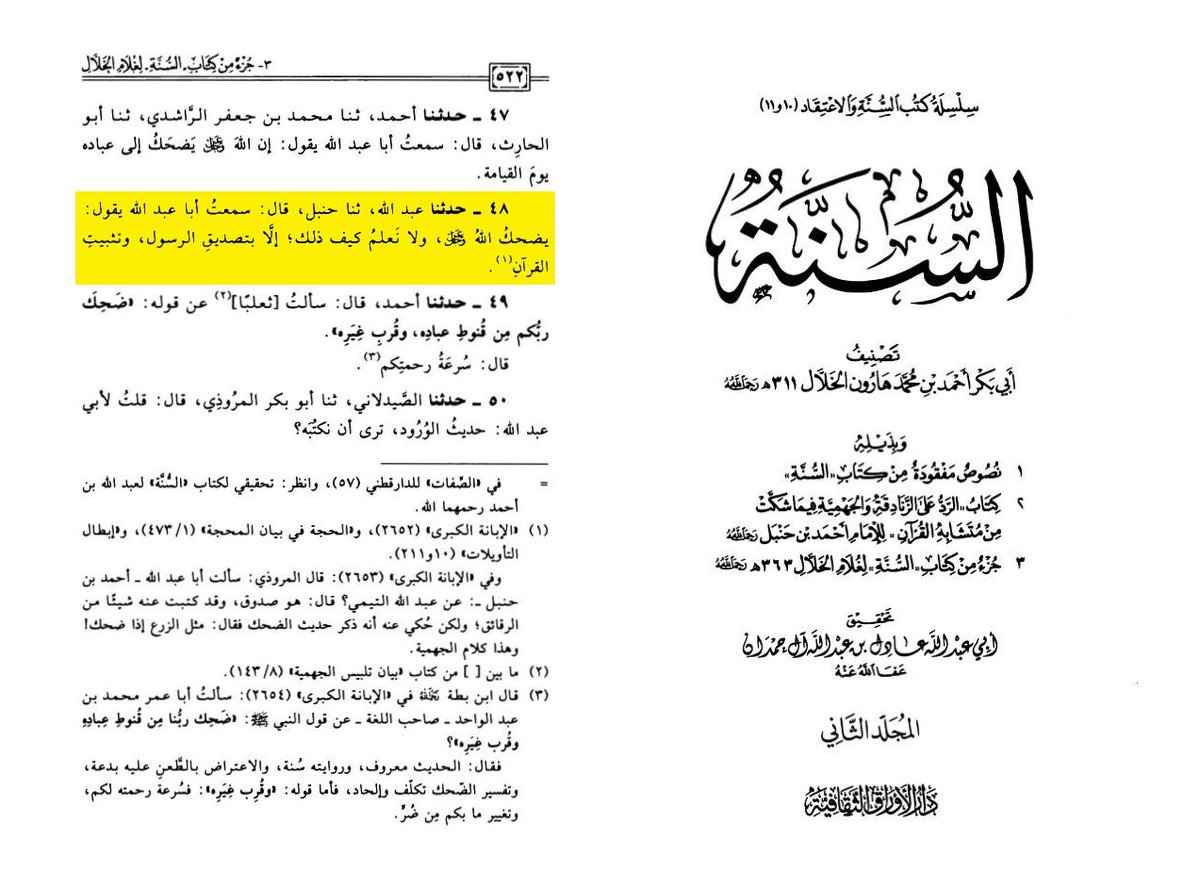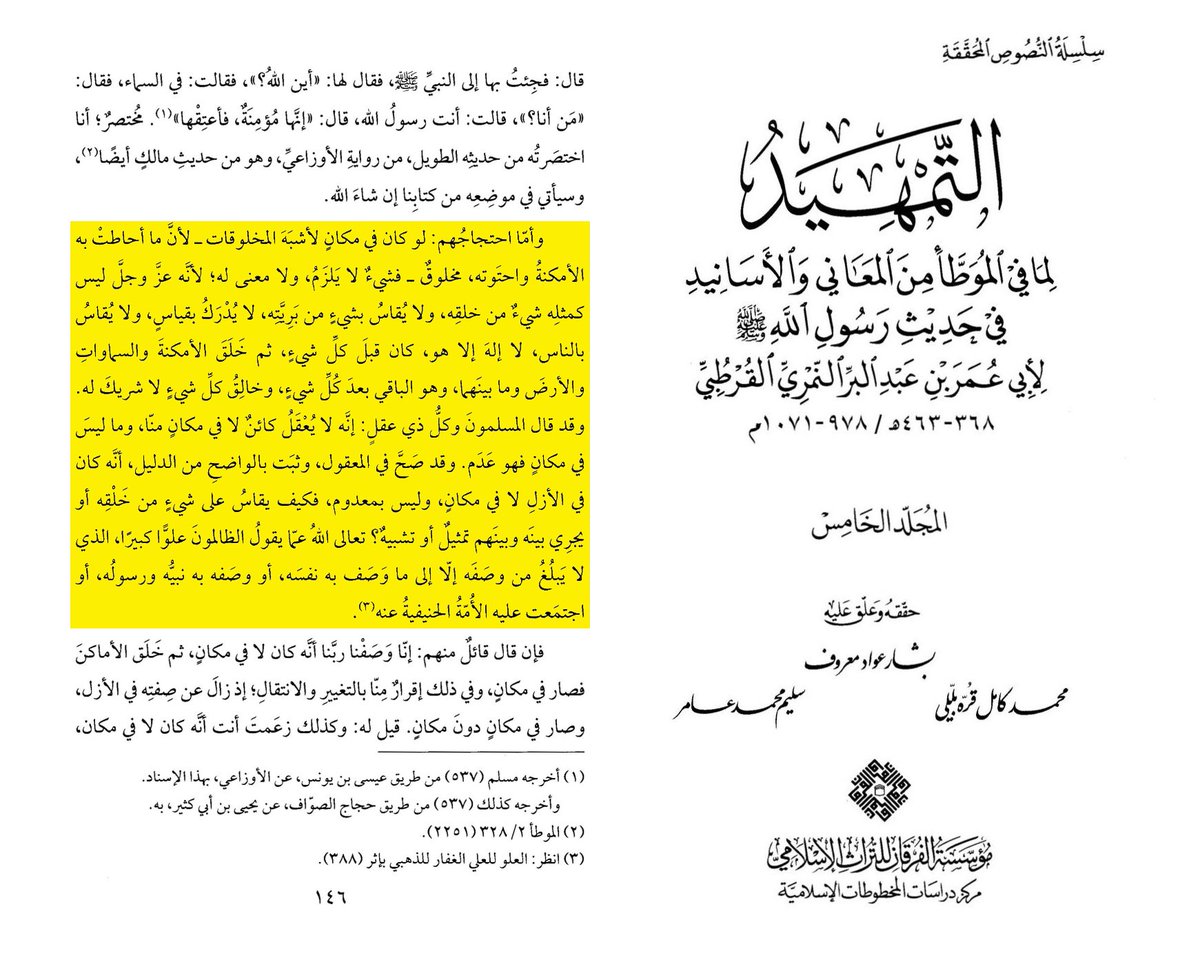[🧵The ʿAqīdah of Imām al-Bukhārī (d. 256)]
(1) His statements on the Kalām of Allāh
(2) His description of Al-Īmān
(3) His affirmation of Al-ʿUluww bil-Dhāt
(4) His maḏhab on Al-Asmāʾ wa al-Ṣifāt
(5) Addressing common objections
(6) Can he be ascribed to the Kullābiyyah?
(1) His statements on the Kalām of Allāh
(2) His description of Al-Īmān
(3) His affirmation of Al-ʿUluww bil-Dhāt
(4) His maḏhab on Al-Asmāʾ wa al-Ṣifāt
(5) Addressing common objections
(6) Can he be ascribed to the Kullābiyyah?
(1) Imām al-Bukhārī (d. 256) said, “I met more than one thousand scholars from across Ḥijāz, Makkah, Madīnah, Kūfah, Baṣrah, Wāsiṭ, Baghdād, Shām, and Miṣr; I met them many times, generation after generation… 

“…and I did not see any single one of them dispute that the Qurʾān is the Kalām of Allāh, not created.” 

Imām al-Bukhārī (d. 256) said: Al-Ḥakam ibn Muḥammad al-Ṭabarī (d. 219) told me: Sufyān ibn ʿUyaynah (d. 198) informed us, “I observed our mashāyikh across seventy years—among them being ʿAmr ibn Dīnār (d. 126)—all saying, ‘The Qurʾān is the Kalām of Allāh, not created.’” 

And Imām al-Bukhārī (d. 256) said: (Sufyān) al-Thawrī (d. 161) said, “Whoever says, ‘The Qurʾān is created,’ then he is a kāfir (disbeliever).” 

And in Khalq Afʿāl al-ʿIbād, Imām al-Bukhārī (d. 256) clearly affirms that Allāh speaks with sound, and he quoted evidence to that effect, and Al-Bukhārī then said, “In this, there is evidence that the voice of Allāh does not resemble the voices of the creation.” 

And Imām al-Bukhārī (d. 256) said, “Whoever claims that I say, ‘My Lafẓ of the Qurʾān is created,’ then he is a liar; I have never said this. I only say, ‘The actions of the servants are created.’” 

Imām al-Bukhārī (d. 256) also affirmed that the Qurʾān is muḥdath (emergent) while not being makhlūq (created). He cited the Āyah, “No mention (i.e., revelation) comes to them muḥdath from their Lord except that they listen to it while at play,” and… 

…Imām al-Bukhārī (d. 256) then said, “The ḥadath (emergence) from Allāh does not resemble the ḥadath of the creation, as He said, ‘There is nothing like unto Him, and He is the Hearing, the Seeing.’” 

From this, we understand that Al-Bukhārī affirmed Al-Ṣifāt al-Ikhtiyāriyyah, which refutes the claim of those who ascribe Al-Bukhārī to the Kullābiyyah. Even the Ashʿarīs have attested to this; for example, Ibn Baṭṭāl (d. 449) said, “He (i.e., Al-Bukhārī) differentiates… 

“…between describing the Kalām of Allāh as being makhlūq (created) and describing the Kalām of Allāh as being muḥdath (emergent); (he holds that) it is forbidden to describe it as being makhlūq but permissible to describe it as muḥdath.” 

On this point, ʿAmr ibn Dīnār (d. 126) said, “I encountered the Ṣaḥābah of the Prophet ﷺ and other than them from the people, saying, ‘The Qurʾān is the Kalām of Allāh; from Him it emerged, and to Him it will return (minhu kharaja wa ilayhi yaʿūd).’” 

(2) Al-Bukhārī (d. 256) said, “I met more than one thousand ʿUlamāʾ across the lands, and I did not find any one of them disagree that Al-Īmān consists of speech and actions, and that it increases and decreases.” Ibn Ḥajar (d. 852) authenticated its isnād. 

(3) In his Ṣaḥīḥ, Al-Bukhārī (d. 256) has a chapter in which he affirms Al-Istiwāʾ upon its ẓāhir and narrates several aḥādīth to affirm ʿUluww, such as Zaynab, may Allāh be pleased with her, saying, “Allāh married me off (to the Prophet ﷺ) from above the seven heavens.” 

Underneath that chapter, Al-Bukhārī (d. 256) titles another chapter in which he uses the Āyah of the angels ascending up to Allāh and other similar Āyāt to prove ʿUluww, which clearly demonstrates his affirmation of ʿUluww bil-Dhāt. And if we look in his Khalq Afʿāl al-ʿIbād… 

Regarding the verse, “Then, He Istawā above the Throne,” Al-Bukhārī (d. 256) quotes the statement of Ibn Masʿūd (d. 32), who said, “The Throne is above the water, and Allāh is above the Throne, and He knows what you are upon.” 

Imām al-Bukhārī (d. 256) said: Ibn al-Mubārak (d. 181) said, “We do not say that Allāh is here on earth, which is what the Jahmiyyah say; rather, He has ascended above the Throne.” 

And Al-Bukhārī (d. 256) also said: it was said to Ibn al-Mubārak (d. 181), “How do we know our Lord?” so he replied, “He is over the heavens, above His Throne.” 

Imām al-Bukhārī (d. 256) reported from Sulaymān al-Taymī (d. 143), who said, “If I am asked about Allāh, I will surely say, ‘He is above the heaven.’” 

Al-Bukhārī (d. 256) said: Muḥammad ibn Yūsuf (d. 212) said, “Whoever claims that Allāh is not above His Throne, then he is a kāfir, and whoever claims that Allāh did not speak with Mūsā (ﷺ), then he is a kāfir.” 

Imām al-Bukhārī (d. 256) said: Ḥammād ibn Zayd (d. 179) said (about the Jahmiyyah), “They do not intend except to say that there is no God above the heaven.” 

Al-Bukhārī (d. 256) said: Saʿīd ibn ʿĀmir (d. 208) said, “The Jahmiyyah are worse in speech than the Jews and Christians; the Jews, Christians, and people of other religions are agreed that Allāh is above the Throne, while the Jahmiyyah say, ‘There is nothing above the Throne.’” 

(4) Al-Bukhārī (d. 256) said: Yazīd ibn Hārūn (d. 206) said about the Jahmiyyah, “Whoever claims ‘The Most Merciful Istawā above the Throne’ in a way which differs from what is affirmed in the hearts of the ʿāmmah (i.e., the masses of the scholars), then he is a Jahmī.” 

Now, what exactly is the claim of the Jahmiyyah regarding Al-Istiwāʾ? ʿAbd al-ʿAzīz al-Kinānī (d. 240) said, “The claim of the Jahmiyyah in regards to ‘The Most Merciful Istawā Above the Throne’ is that ‘Istawā’ does not mean anything except ‘Istawlā’ (dominated).” 

On the Āyah, “Then, He Istawā ilā al-samāʾ,” Al-Bukhārī quotes Abū al-ʿĀliyah (d. 93) explaining ‘Istawā’ to mean Irtafaʿ (rose over). Likewise, on the Āyah, “Then, He Istawā above the Throne,” Al-Bukhārī quotes Mujāhid (d. 103) saying, “He ʿAlā (ascended) over the Throne.” 

To set the stage for my next point, Al-Tirmidhī (d. 279), the student of Al-Bukhārī (d. 256), said, “As for the Jahmiyyah, then they denied these narrations, and they said, ‘This is tashbīh!’ They said, ‘Allāh did not create Ādam with His Hand—the meaning of Hand is Power.’” 

On that point, we find Imām al-Bukhārī (d. 256) refuting these Jahmī claims under Kitāb al-Radd ʿalā al-Jahmiyyah, where he titles a chapter with the Āyah, “He (i.e., Ādam) whom I created with My Hands…” 

…and he goes on to list a number of aḥādīh on affirming Ṣifah al-Yad, including the ḥadīth of the Jewish rabbi affirming the Aṣābiʿ of Allāh. 

Al-Bukhārī (d. 256) titled another chapter with the Āyah, “That you may be brought under my Eye,” and under it, Al-Bukhārī then reports the ḥadīth in which the Prophet ﷺ says, “Indeed, he (i.e., the Dajjāl) is one-eyed, and verily, your Lord is not one-eyed.” 

(5) Doubt: on the Āyah, “And everything will perish except His Face,” Al-Bukhārī (d. 256) made taʾwīl of “Except His Face” to mean “Except His dominion (mulk).” 

My response to this is partially based on the following article: umabdullah.wordpress.com/2007/07/21/did…
Response: some manuscripts have the wording: “يقال: … إلا ملكه,” and Al-Ḥafiẓ ibn Ḥajar (d. 852) mentions that in the riwāyah of Al-Nasafī (d. 295) of Ṣaḥīḥ al-Bukhārī, the wording is: “Maʿmar (ibn al-Muthannā) said, ‘Except His dominion (mulk).’” 

In other words, “إلا ملكه” is the tafsīr of Maʿmar ibn al-Muthannā (d. 210), not necessarily Al-Bukhārī’s (d. 256). Al-Ḥāfiẓ ibn Kathīr (d. 774) suggests that Al-Bukhārī's opinion is that the Āyah means, “Except that which was done seeking His Face (i.e., righteous actions).” 

Even if we say Al-Bukhārī (d. 256) accepted “Except His mulk (dominion),” it can be argued that what is meant is Ṣifah al-Mulk (i.e., the Sovereignty of Allāh), not the created dominion/kingdom of Allāh, as Maʿmar (d. 210) himself describes the created mulk as perishing. 

And Abū al-Layth al-Samarqandī (d. 373) also mentioned the tafsīr of “إلا ملكه,” and he makes clear that what is meant is Ṣifah al-Mulk, not the created dominion or kingdom of Allāh. From here, we can say that “إلا ملكه” is simply تفسير بالإلزام, which is not at all taʾwīl. 

In other words, this is tafsīr of what the Āyah entails/implies. The context of the Āyah alludes to Mulk (Sovereignty): “And everything will perish except His Face; to Him is the Ḥukm, and to Him you will return.” Al-Ḥāfiẓ ibn Kathīr (d. 774) explains “Ḥukm” to mean “Mulk.” 

This is like the Āyah, “To whom belongs sovereignty this Day? To Allāh, the One, the Prevailing.” So once it is established that Sovereignty is alluded to in 28:88, saying “إلا ملكه” is only تفسير بالإلزام; doing so doesn’t rule out that the Āyah also alludes to Ṣifah al-Wajh.
Now, if we look in his Ṣaḥīḥ, under Al-Radd ʿalā al-Jahmiyyah, Al-Bukhārī (d. 256) titles a chapter with the Āyah, “And everything will perish except His Face,” and Al-Bukhārī then reports under it the ḥadīth in which the Prophet ﷺ says, “I seek refuge in Your Face.” 

Here, it is clear that Imām al-Bukhārī (d. 256) did indeed understand the Āyah as alluding to Ṣifah al-Wajh. Hence, Ibn Baṭṭāl (d. 449) said, “He (i.e., Al-Bukhārī) used this Āyah and ḥadīth as a proof that Allāh has a Wajh (Face) which is a Ṣifah Dhātī.” 

And Ibn Khuzaymah (d. 311) said, “We and all of our teachers across the lands affirm a Wajh (Face) for our Lord as He has informed us in His decisive revelation; He has described it with Majesty and Honour, affirmed it as everlasting, and negated it from perishing.” 

And interestingly enough, among the teachers of Ibn Khuzaymah (d. 311) is Imām Muḥammad ibn Ismāʿīl al-Bukhārī (d. 256) himself. That’s a wrap.
So in conclusion:
• The tafsīr “إلا ملكه” is that of Maʿmar (d. 210), not necessarily Al-Bukhārī’s.
• Ibn Kathīr and others have indicated that Al-Bukhārī did not favour “إلا ملكه.”
• Even if we say Al-Bukhārī did favour it, it would be تفسير بالإلزام, not تأويل.
• The tafsīr “إلا ملكه” is that of Maʿmar (d. 210), not necessarily Al-Bukhārī’s.
• Ibn Kathīr and others have indicated that Al-Bukhārī did not favour “إلا ملكه.”
• Even if we say Al-Bukhārī did favour it, it would be تفسير بالإلزام, not تأويل.
Doubt: Abū Sulaymān al-Khaṭṭābī (d. 388) narrates from Ṣaḥīḥ al-Bukhārī that Imām al-Bukhārī (d. 256) made taʾwīl of the laughing of Allāh by saying, “The meaning of ‘laughing’ is ‘Mercy.’” 

Response: its attribution to Al-Bukhārī (d. 256) is doubtful for a number of reasons, some of which are highlighted here: m.facebook.com/story.php?stor…
There is discussion on the manuscripts which include this “taʾwīl,” but I will mention Al-Ḥāfiẓ ibn Ḥajar (d. 852) who said, “I have not found this in any of the manuscripts we have from Al-Bukhārī.” This is significant, as he had access to a multitude of early manuscripts. 

Badr al-Dīn al-ʿAynī (d. 855) similarly said, “What Al-Khaṭṭābī (d. 388) has attributed to Al-Bukhārī (d. 256) is not found in the manuscripts which are in the hands of the people, and Allāh knows best.” 

Another factor which contributes to the strange nature of this attribution to Imām al-Bukhārī (d. 256) is the fact that it contradicts the agreed-upon view of the Salaf, including the very teachers and students of Al-Bukhārī himself.
For example, Al-Qāsim ibn Sallām (d. 224), the shaykh of Al-Bukhārī (d. 256), said regarding the aḥādīth of the Ṣifāt, including the Qadam and laughing of Allāh, “These (aḥādīth), according to us, are true, and we do not doubt them… 

“…but when it is said, ‘How will He place His Foot?’ or, ‘How does He laugh?’ then we say, ‘That is not to be explained, and we have not heard anyone (from the ʿUlamāʾ) explain this.’” 

And Ibn Khuzaymah (d. 311), the student of Al-Bukhārī (d. 256), has a chapter in his Kitāb al-Tawḥīd which he titled, “Chapter on affirming that our Lord laughs, without describing His laughing or likening His laughing to the laughing of the creation.” 

Ibn Mājah (d. 273), who learned from Al-Bukhārī (d. 256), also includes the ḥadīth of the laughing of Allāh under the chapter, “That which the Jahmiyyah denied.” 

And major Imāms from the Salaf who are quoted by Al-Bukhārī (d. 256) in books such as his Khalq Afʿāl al-ʿIbād are seen affirming the laughing of Allāh as has come; take, for example, Sufyān ibn ʿUyaynah (d. 198), as is narrated by Abū Dāwūd al-Sijistānī (d. 275): 

Similarly, Al-Fuḍayl ibn ʿIyāḍ (d. 187) said, “He descends however He wills, and He laughs however He wills […] so when a Jahmī says to you, ‘I disbelieve in a Lord who descends from his makān!’ then say to him, ‘I believe in a Lord Who does whatever He wills!’” 

And interestingly, in Khalq Afʿāl al-ʿIbād, Al-Bukhārī (d. 256) himself also said: Al-Fuḍayl ibn ʿIyāḍ (d. 187) said, “When a Jahmī says to you, ‘I disbelieve in a Lord who descends from His makān!’ then say to him, ‘I believe in a Lord Who does whatever He wills!’” 

This shows that Al-Bukhārī (d. 256) was not unaware of these statements of the Aʾimmah al-Salaf affirming Ṣifah al-Ḍaḥik without taʾwīl or tafwīḍ. Would it make sense in matters of ʿAqīdah for Al-Bukhārī to contradict the very same scholars that he references and follows?
In any case, even if it is authentically transmitted from Al-Bukhārī (d. 256) that he explained ‘laughing’ with ‘Mercy,’ then this may also be understood as تفسير بالإلزام, since the laughing of Allāh for His servant implies that Allāh is pleased and Merciful to him.
So if one says, “When Allāh laughs at His servant, this means that He is also pleased and Merciful with him,” then this is correct and not taʾwīl; rather, this is only تفسير بالإلزام, which is to explain ‘laughing’ with what it entails while still affirming that Allāh laughs.
Hence, when Bishr al-Marīsī al-Jahmī (d. 218) explained the laughing of Allāh to mean His pleasure and Mercy, Imām al-Dārimī (d. 280) responded by saying, “As for your statement, ‘His laughing means His pleasure and Mercy,’ then… 

“…you have spoken the truth in part, since Allāh does not laugh at someone except due to His pleasure for him, so His pleasure and His laughing are linked.” In other words, merely explaining the laughing of Allāh with His Mercy is falls under تفسير بالإلزام, not taʾwīl. 

It’s only taʾwīl when one explains the laughing of Allāh to mean His Mercy while intending thereby to negate the fact that Allāh laughs in the first place; in this case, it's no longer تفسير بالإلزام and is instead تأويل, and this is what Al-Marīsī (d. 218) had in mind…
…so Imām al-Dārimī (d. 280) rebuked him by saying, “However, you deny that Allāh laughs and you affirm for Him pleasure only.” 

In summary, Al-Marīsī (d. 218) was correct in that the laughing, pleasure, and Mercy of Allāh are all linked, but he was, on the other hand, incorrect as well since he only affirmed pleasure and Mercy while negating that He laughs, thus making تأويل and not تفسير بالإلزام.
So when Al-Bukhārī (d. 256) (allegedly) explains ‘laughing’ to mean ‘Mercy,’ those who use this argument cannot definitively claim that this is taʾwīl, as there is no external evidence for such an assertion; if anything, the external evidence indicates otherwise.
Moreover, Imām Aḥmad ibn Ḥanbal (d. 241) declares this kind of taʾwīl of Ṣifah al-Ḍaḥik to be from the taʾwīlāt of the Jahmiyyah! Yikes… 

…maybe one should think twice before ascribing a Jahmī belief to Imām al-Bukhārī (d. 256), especially considering the fact that he quotes Sallām ibn Abī Muṭīʿ (d. 164) as saying, “The Jahmiyyah are kuffār.” 

So in conclusion:
• The vast majority of manuscripts and transmitters of Ṣaḥīḥ al-Bukhārī do not include this “taʾwīl.”
• This “taʾwīl” would contradict the well-known statements of the Salaf, including the very teachers and students of Al-Bukhārī (d. 256) himself.
• The vast majority of manuscripts and transmitters of Ṣaḥīḥ al-Bukhārī do not include this “taʾwīl.”
• This “taʾwīl” would contradict the well-known statements of the Salaf, including the very teachers and students of Al-Bukhārī (d. 256) himself.
• Even if we say that it is authentically transmitted from Al-Bukhārī (d. 256) that he explained ‘laughing’ with ‘Mercy,’ this would fall under تفسير بالإلزام, not تأويل.
And as a side note, Abū Sulaymān al-Khaṭṭābī (d. 388) himself, although originally being upon the maḏhab of taʾwīl, later repented from it and turned against Ahl al-Kalām, as is documented by Al-Ḥāfiẓ ibn Rajab (d. 795) in his Fatḥ al-Bārī (5/103) among others. 

After his repentance, Imām al-Khaṭṭābī (d. 388) said in his book, Al-Ghunyah ʿan al-Kalām wa Ahlih, “As for what you have asked regarding the Ṣifāt […] then the maḏhab of the Salaf is to affirm then and observe then upon their apparent meanings (ʿalā ẓāhirihā).” 

(6) Absolutely not. Imām al-Bukhārī (d. 256) contradicts the ʿAqīdah of Ibn Kullāb (d. 240) and his followers on a multitude of core issues…
…for instance, regarding Al-Ṣifāt al-Ikhtiyāriyyah, then this is denied by the Kullābiyyah but is affirmed by Imām al-Bukhārī (d. 256) and the rest of the Salaf, as was explained beforehand.
https://twitter.com/mahmud_murrah/status/1640849815646134272
Imām al-Bukhārī (d. 256) also directly refutes the belief of the Kullābiyyah and Ashāʿirah when he affirms explicitly that the Lafẓ of the Qurʾān is not makhlūq (created), and that whoever attributes this view to him is a liar.
https://twitter.com/mahmud_murrah/status/1640849809421774848
Imām al-Lālikāʾī (d. 418) also narrated a similar report via another isnād from Imām al-Bukhārī (d. 256) in which he denies the belief of the Lafẓ being created. 

And Imām Aḥmad (d. 241) was known to be extremely harsh against the Kullābiyyah, yet he would accompany and greatly praise Imām al-Bukhārī (d. 256). This obviously indicates that Al-Bukhārī was not a Kullābī.
https://mobile.twitter.com/mahmud_murrah/status/1639005424061128705
And although a lot more could be mentioned, by the end of this thread, it should be no surprise that Al-Ḥāfiẓ al-Mizzī (d. 742) was imprisoned by the Ashʿarīs when he was caught reading Khalq Afʿāl al-ʿIbād by Imām al-Bukhārī (d. 256). I wonder why… 

• • •
Missing some Tweet in this thread? You can try to
force a refresh



















